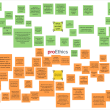Learnings from one year of PRO-Ethics
3. Mär 2021
Throughout 2020, the RFO partners of PRO-Ethics spent considerable time sharing and exchanging their experiences from four participatory pilots of our “pilot phase I”. We are excited to share our learnings from one year of PRO-Ethics.
In our first year, we closely examined four ongoing “real life experiments”, where citizens were invited to participate in a range of RFO activities. When we talk about “citizens,” we actually mean a broad range of possible participants, such as patients and their support networks, people affected by a specific issue, end-users, stakeholders, interest groups, residents of an area, or citizens in the broadest sense (which is not necessarily tied to “citizenship”). We situated each RFO activity under scrutiny within at least one of three so-called “fields of action”, namely 1) citizen participation in innovation projects; 2) citizen engagement within agencies’ processes; or 3) citizen engagement in evaluation processes.
To enable a more fruitful and challenging reflection, each RFO hosting a pilot case partnered with another RFO from our consortium. To facilitate exchange, several questionnaires were prepared by the technical partners ZSI and DBT. These questionnaires were supplemented by templates for reporting and assessing as well as a monitoring and evaluation concept, which provided a basis for comparing the different pilots and pinpointing similarities and differences. Finally, a cross-pilot learning workshop took place in June 2020, which allowed for more intense exchange between all RFO partners. The aim of this process is to lay the groundwork for the development of pilots for our “pilot phase II,” starting in spring 2021. Furthermore, PRO-Ethics develops a comprehensive Ethics Framework to support RFOs in planning and implementing participatory activities in an ethically sound manner.
The core findings from our pilot I reflections can be summarised as such:
Participation is a time-consuming, complex process
Participatory activities demand extensive investment of time and resources. This includes both the selection and recruitment of participants as well as necessary trainings and support measures to facilitate participation, all of which depend on the specificities of the activities to be implemented.
There is no standard format that fits all
There is a great variety of different participatory activities research funding organisations may implement. These activities vary in their goals, methodologies, the publics they recruit, the intensity of their intended involvement, and the respective timeframe of participation (when and for how long participatory methods are employed). This in turn means that any guidelines developed on the basis of our learnings need to be flexible enough to be tailored to the specificities of the RFOs as much as the national ecosystems they operate in.
Dealing with ethical issues and risks requires closer scrutiny
All RFO partners of the PRO-Ethics project – and presumably most research funding organisations around the world – employ guidelines on dealing with ethical issues. While there definitely is some overlap between these guidelines, there are still differences in how ethical issues are handled in practice, especially because both activities and legal landscapes may differ greatly. PRO-Ethics’ ultimate goal is to provide a more standardised framework useful to all interested RFOs.
Expectations of all participants, as well as their specific roles, need to be carefully reflected upon
Researchers, innovators, stakeholders and citizens all bring different knowledge(s) and experiences to the table. All should be aware of what their respective roles are, what is expected of them, and what their specific say is. This is also the prerequisite for valuing and respecting each other. The balance between researchers and innovators on the one hand, and citizens on the other, is also an important aspect of maintaining integrity. This is especially true in inter- and transdisciplinary settings.
Aspects of equality and inclusion must be taken into account when developing participatory formats
While equality throughout a participatory process is considered by default by all RFO partners in PRO-Ethics, in practice, this is often done in a perfunctory and pragmatic way. Gender, for instance, has not been prioritised systematically within most cases of pilot I. Going forward, questions of equality and how to ensure equal access and participation of all relevant actors throughout the entirety of the process will be central dimensions in the development of new pilots, as well as the generalised Ethics Framework developed in the course of the project.
If you are interested in finding out more, you can find the complete deliverable D2.1 Summary and Evaluation Reports on Pilot I Results here.
Verwandte Artikel:
- Projekt: Participatory Real Life Experiments in Research and Innovation Funding Organisations on Ethics
- News: First PRO-Ethics Newsletter
- News: First PRO-Ethics Policy Brief
- News: Kick-off PRO-Ethics
- News: PRO-Ethics launches its project website
- News: PRO-Ethics Online Cross-Learning Workshop
- News: PRO-Ethics Workshop with RFOs & research ethics and integrity experts
- News: Take part in the PRO-Ethics online consultation
- News: Winner of the PRO-Ethics Open Call
- News: How can we successfully involve citizens in R&I?
- News: What has PRO-Ethics learnt from engaging with research and innovation experts?
- News: Pilot Reflection Workshop in Brussels
- News: PRO-Ethics 3rd Cross-Learning Workshop
- News: Call for Contributions: Connect. Collaborate. Create. Conference in Paris
- News: Participation in research funding and implementation
- News: "Connect.Collaborate.Create." Conference successfully completed!














































